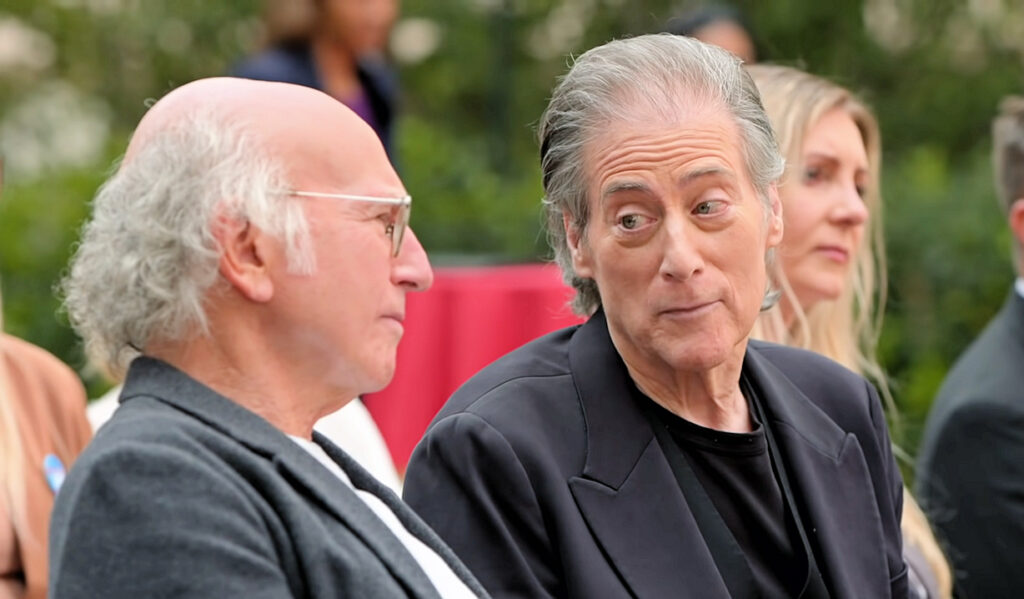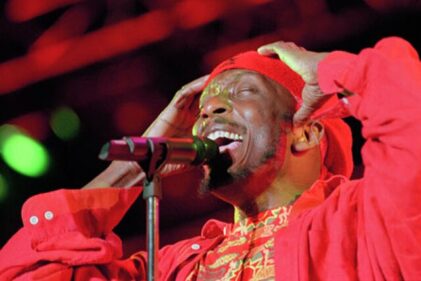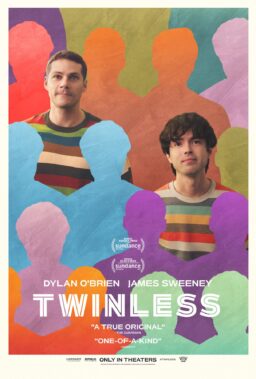Richard Lewis was the first comedian I tried to model myself upon. That’s a nice way of saying I straight-up stole his look, vibe, and way of speaking for several years in the late 1980s and early ‘90s. I am sure I was insufferable during this period—more than I am now, if you can imagine. I had a couple of friends who also stole Richard Lewis’s entire deal. One even grew his hair out and bought a wardrobe of baggy black t-shirts or short-sleeved collared shirts with strangely opulent pockets and stitching, and jet-black pants and black shoes. When we all did stuff together in public, we looked like members of a cult. Because we were.
Most people had no idea who Richard Lewis was back then. Sure, comedy fans knew he was on track to become one of the greats, and he was sort of breaking through, slowly, in his own way. But he could probably have walked down any big city street in America and not been noticed by anyone but people who watched a lot of late night talk shows (he was a regular on Johnny Carson and David Letterman) or saw his standup specials on cable (between 1988 and 1991, the years in which I slavishly impersonated Richard Lewis, he released three classics: I’m Exhausted, I’m Doomed, and Richard Lewis: The Magical Misery Tour).
But those who knew, knew.
He could act. He was good. His best performance is probably on “Curb Your Enthusiasm” as himself, aka Larry’s best friend. (He’d been friends with David almost his entire life.) But he was also memorable as Prince John in Mel Brooks’s “Robin Hood: Men in Tights,” where his mole changes position from shot to shot. And he was in sitcoms that were never big but built loyal audiences. One was “Anything But Love,” starring Lewis and Jamie Lee Curtis as writers at a Chicago magazine who had sexual chemistry galore but weren’t a couple. It ran three seasons and got overhauled twice by the network, which kept trying to turn a cult favorite into a hit. “Daddy Dearest,” which ran less than a year in 1993, was a father-son relationship show that teamed him with insult comic Don Rickles. It never quite figured out what it was doing, but it never got the chance to, either.
No matter. It was the standup, the monologues, the patter that made Lewis great, and that gave me a target to shoot for—in my warped mind, at least. I could’ve listened to him talk for twelve hours straight, given the chance. He might have been the coolest comic that ever lived whose stage persona was based entirely on confessing what a disaster he was.
It was the standup that made me not just love Lewis, but want to be Lewis. Even as a young man, I knew I was never going to be one of those guys who seemed to have it all figured out. But when I looked at Lewis, I saw a guy who knew he didn’t have it all figured out; in fact, he knew that he didn’t have the slightest clue how his own personality worked or what it would take for him to become happy. That appealed to me, that level of self-knowledge. Knowing what you don’t know is progress, right? Maybe a little?
I probably first saw Lewis on David Letterman’s show in high school and found him hilarious; a West Coast, self-aware, self-lacerating Baby Boom-generation comic, in the tradition of somebody like Albert Brooks, though Lewis, unlike Brooks, seemed content mainly to be a performer who often wrote his own stuff, and never tried to be a triple-threat auteur filmmaker, as Brooks ultimately became. Lewis represented himself as a mess, as his own worst enemy, as a boiling vat full of largely untreated neuroses, and as such an incompetent relationship partner that he drove women either towards marriage or away from heterosexuality, but at the same time, he was obviously great at what he did and was on TV a lot—and his persona was that he had no trouble getting women, just keeping them.
That last part appealed to me because I was an inexperienced young man just starting out in the world of dating and sex and relationships and thought that if Lewis’s description of himself was true, it meant there was hope for a guy like me, who was well-read and had a sense of humor and could look presentable under certain circumstances but would never be mistaken for a movie star, a jock, or one of those Michael Douglas master-of-the-universe types, which was the template for “desirable” then. One of the lines I loved to quote was, “One of these days I’m gonna write a sex manual. It’s gonna be called Ow! You’re On My Hair.” “I tried phone sex,” he said once. “It gave me an ear infection.” “During sex, I fantasize that I’m someone else.”
He exaggerated. Even his exaggerations were exaggerated. One of his most lasting contributions to the English language was appending the words “from hell” to a noun. “Girlfriend from hell.” “Restaurant from hell.” In season three of “Curb” there was a subplot about Lewis trying to officially be given credit for creating the phrase “[BLANK] from hell.” The Yale Book of Quotations credited him. He wrote to Bartlett’s Book of Familiar Quotations asking them to include him there, too. They refused. The nerve! He titled his 2015 memoir Reflections from Hell: Richard Lewis’ Guide On How Not to Live.” It was a bestseller. Eat it, Barlett’s.
Part of Richard Lewis’ thing was that he was disappointed, always, by everything. Everything! Sometimes he would pre-disappoint or anticipate disappointment. He’d also do a thing where he’d start a line with what sounded like a greeting card platitude and then in the back half of the sentence, shred it completely. It was hilarious because for a second there, his bright delivery made you think maybe he was going to say something to indicate that he’d found happiness, that he’d found hope, that he believed in something. But no: “When you’re in love, it’s the most glorious two-and-a-half days of your life.”
His bits about growing up Jewish were incredible. He mixed classic standup kvetching with surreal embellishments that turned his life into a pretzel-twisted dreamscape. “We aren’t very religious—we had a Menorah on a dimmer.” “New Year’s Eve was a drag. We’d go to my grandmother’s apartment in Brooklyn and at midnight we’d watch our hopes drop.” “My dad was such a successful caterer that he was booked on my bar mitzvah, and I had my party on a Tuesday. Talk about low self-esteem.” When he brought up Hanukkah, it was to gripe about what a slog it was after day one. “You get to the seventh day and you’re like, ‘Oh, thanks, pop,’ and it’s like, an 8×10 glossy of Soupy Sales.”
He was the first comedian I can recall who brought up therapy not just to make therapy jokes, though he certainly did that (“I’m out of therapy—if I do go back, I’m gonna take a pass/fail”), but to talk in detail about his mental health struggles. He was very, very depressed. He was a hypochondriac. He had social anxiety. He had all sorts of phobias. I’m just going on what Richard Lewis said when I list all his challenges. He might’ve been exaggerating for comic effect, as comedians are known to do. But I don’t think so. Something in the eyes told you that he wasn’t actually kidding about the details. He had a haunted look, even when he was laughing.
Lewis went public about being a recovering alcoholic and drug addict, and talked about that part of his life with journalists and talk show hosts. He was probably the highest profile comedic actor since Dick van Dyke to do that. “It’s hard to accept all the stupid things I’ve done in my life,” he said of his addiction and recovery, “but it’s even harder to accept that I can’t undo them.”
Lewis retired from acting last year after revealing that he had Parkinson’s disease. He’d broken bones from injuries prior to that and was in bad shape near the end. His frailness was turned into the subject of humor in late seasons of “Curb,” including the twelfth and supposedly final one. There was even a subplot about a kidney donation.
“Comedy is defiance,” he said. “It’s a snort of contempt in the face of fear and anxiety.”
He believed in being kind to himself and forgiving himself, and that resonated as well. He must have known how brilliant he was because people kept telling him, and they were right. But he never carried himself with arrogant pride. He wasn’t here to teach us lessons, but to talk about what he was thinking and feeling. If you got something out of it, great. He erred on the side of, “Don’t take advice from me, I’m a disaster.”
“I saw Richard Lewis being interviewed somewhere in an all-black outfit giving advice to young comics,” wrote his friend Andy Kindler. “He was saying you don’t have to start in LA or NY. Just get good at it somewhere. Then he said: ‘But what do I know? Look at me. I’m dressed like Satan at a barbecue.’”
“I may not have all the answers,” Lewis said, “but I’ll always have a joke.”












